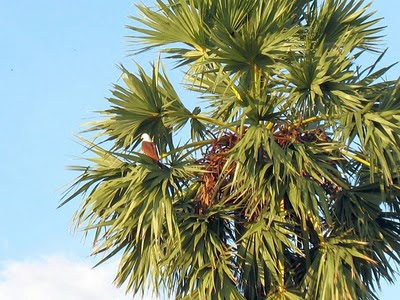This bird (Tamil: Krishna Parunthu) is found at Tiruvannamalai, and there are several Brahminy Kite nests by Samudram Lake. Where the nests are known, the birds are worshipped as representative of Garuda (the sacred Eagle), but this bird is actually a Kite.
The Brahminy Kite (Haliastur indus) is also known as the Red Backed Sea Eagle and the Singapore Bald Eagle. It is a medium-sized bird of prey in the family Accipitridae, which also includes other diurnal raptors such as eagles, buzzards and harriers.
The Brahminy Kite (Haliastur indus) is also known as the Red Backed Sea Eagle and the Singapore Bald Eagle. It is a medium-sized bird of prey in the family Accipitridae, which also includes other diurnal raptors such as eagles, buzzards and harriers.
The Brahminy Kite has long broad rounded wings; short and rounded tail when fanned. Its head, neck and breast are white with rest of its body bright chestnut and primaries tipped black and feet yellow. In flight it exhibits slow, deep flapping and displays long, broadly angled wings.
Brahminy Kites are sedentary and do not migrate. They are more scavengers but also hunt for small prey (fish, crabs, shellfish, frogs, rodents, reptiles, even insects). They forage both over water and land, soaring 20-50m above the surface. Prey on the water surface is snatched with their talons but this bird doesn’t actually dive into water. This bird also scavenges from food scraps and garbage and flushes birds roosting on mudflats into flight to identify the weak. They are attracted to fires to catch fleeing animals. Their catch is eaten on the wing, to prevent theft. When several quarrel over a meal, they squeal.
Habitats best suited to Brahminy Kites are broad mudflat and freshwater wetlands such as rice fields and marshes and even in cultivated areas. The Brahminy Kite is a bird which prefers to be near water. It is especially common in coastal areas, by lakes or near large areas of rice fields. It is commonly found near human habitation and near rice fields it is the most common bird of prey.
Brahminy Kites are sedentary and do not migrate. They are more scavengers but also hunt for small prey (fish, crabs, shellfish, frogs, rodents, reptiles, even insects). They forage both over water and land, soaring 20-50m above the surface. Prey on the water surface is snatched with their talons but this bird doesn’t actually dive into water. This bird also scavenges from food scraps and garbage and flushes birds roosting on mudflats into flight to identify the weak. They are attracted to fires to catch fleeing animals. Their catch is eaten on the wing, to prevent theft. When several quarrel over a meal, they squeal.
Habitats best suited to Brahminy Kites are broad mudflat and freshwater wetlands such as rice fields and marshes and even in cultivated areas. The Brahminy Kite is a bird which prefers to be near water. It is especially common in coastal areas, by lakes or near large areas of rice fields. It is commonly found near human habitation and near rice fields it is the most common bird of prey.
Brahminy Kites mate (November-December) on or near the nest which is generally located in tall trees. Although they do not share nesting trees, pairs may nest less than 100m apart. The nest is compact and made of twigs and sticks and often lined with dried mud. A first-time nest is usually thin, but as the pair reuse the site, the nest thickens. 2 eggs are laid, white with sparse red-brown blotches. Both parents raise the young.
The call of the Brahminy Kite is a thin mewing scream 'kweeaa' or 'kyeeer' usually while soaring. This bird which is very tolerant of humans, is an unfussy scavenger that can survive in a wide range of habitats. Although it is described as generally quiet, individuals which have been in constant or regular contact with humans tend to be noisier.
The call of the Brahminy Kite is a thin mewing scream 'kweeaa' or 'kyeeer' usually while soaring. This bird which is very tolerant of humans, is an unfussy scavenger that can survive in a wide range of habitats. Although it is described as generally quiet, individuals which have been in constant or regular contact with humans tend to be noisier.
As the bird has a tendency to raid fish farms and steal chickens, it is sometimes regarded as a pest in other places in the world. In some S.E. Asia countries the bird, along with other types of Kite are hunted with the young taken for pets.
However in India the bird has great status due to its connection with Garuda. And its name i.e. Brahminy results from its association with the Indian God Vishnu.









1 comment:
Yes the Brahminy Kite is quite lovely. They are very agreeable to being fed by people. And hereabouts, where they are worshipped as Lord Vishnu's vahana lots of people go out in the evenings with tasty morsels to leave on the ground for the birds.
Post a Comment